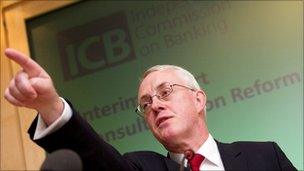Independent Commission on Banking to unveil 'ring fence'
- Published

Commission chairman Sir John Vickers is expected to offer the banks years to reorganise themselves
How UK banks should ring-fence operations deemed vital for the UK economy is set to be detailed by the Independent Commission on Banking.
After a 14-month review, the commission is expected to recommend banks separate their high street businesses from their riskier financial markets businesses.
The split is intended to prevent the government having to bail out banks in a future financial crisis.
However, the changes are likely to take several years to implement.
The commission, which comprises bankers and economists and is headed by former Bank of England chief economist Sir John Vickers, was set up by the government in June 2010.
Moral hazard
A key concern behind its establishment was moral hazard, which is the incentive for banks to take on too much risk in the knowledge that if there is a financial crisis, they will be rescued by the government, as happened in 2008-09.
It is expected to say that the banks' UK deposit-taking, lending and payments operations, which are critical to the functioning of the UK economy, should be transferred into a separate subsidiary.
Banks would then be banned from using these subsidiaries to provide cash to, or absorb losses from, their other businesses.
This falls short of the complete break up of the banks called for by Business Secretary Vince Cable when the commission was set up.
The assumption behind the ring fence is that the banks' investment banking and capital markets businesses could then safely be allowed to fail, without this also bringing down their high street banking businesses.
Details of the ring fence, including exactly which business lines will fall within it, and what level of interaction with the rest of the bank will be permitted, are not yet known.
The most important detail will be how quickly the reforms are to be implemented, with banks complaining that separating out their businesses is logistically and legally complicated and cannot be rushed.
The commission is thought to favour immediate legislation that nonetheless allows the banks several years to complete the ring fence.
Mr Cable has called for swift implementation of the proposals to split high street and investment arms of banks.
The Liberal Democrats want the recommendations to be included in the current Financial Services Bill, but it's thought the chancellor is keen to see the changes introduced in a way that will not damage the banks or the UK's appeal as a financial centre.
Swiss precedent
There has been speculation that the government may seek to water down or further delay implementation, in response to the recent slowdown in the UK economy.
The ring fence would be likely to increase what it costs UK banks to fund their investment banking operations, compared with their international competitors.
Without a government bail-out, the lenders of a UK investment bank would expect to take losses if that bank became insolvent in the future, and are therefore likely to charge a higher interest rate.
Banks with large investment banking operations, such as Barclays and Royal Bank of Scotland, are likely to lose out most from the proposal.
Other recommendations by the commission may include the requirement for bigger banks to increase their loss-absorbing capital to 10% of their risk-adjusted assets, to support their high street banks.
On top of that they may be required to take out special debts that automatically convert into shares in the bank if the bank's capital falls to a dangerously low level.
Those recommendations would mirror similar requirements imposed by Switzerland on its two biggest banks.